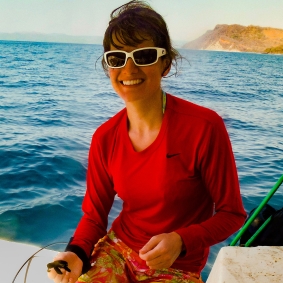Knauss legislative fellowships in Congress help build careers — and they're fun and educational. See our video and fact sheet for details.
Aimee Hoover

Fellowship Institution:
NOAA, National Marine Fisheries Service, Office of Science and TechnologyStart Year:
2017Aimee Hoover is serving in the NOAA National Marine Fisheries Service’s Office of Science and Technology. She is part of the National Observer Program, working on the National Bycatch Report Update and hoping to improve the work environment for fisheries observers.
Hoover is completing her master’s degree in fisheries science at the University of Maryland Center for Environmental Science. She is studying the movement of Costa Rican sea turtles to improve management and conservation of these endangered species. Her field studies on hatchling sea turtles took her to the Cayman Islands and remote beaches in Costa Rica.
She obtained her bachelor’s degree in marine science and biology from the University of Miami. She went on to study how fish are impacted by invasive species in the Great Lakes and worked in Hawaii examining commercial and recreational fisheries. Almost a year of her time in Hawaii was spent collecting data while living aboard ships. Hoover helped to develop online tools to reduce the unwanted catch of leatherback turtles in the Hawaiian longline fishery and prevent ship strikes of blue whales off the California coast.
Blog Articles:
Turtles, Teaching, and Tales, Oh My! An Afternoon Volunteering at the Smithsonian
Call for Symposium Presenters and Authors
The Chesapeake Rising: Innovative Law and Policy Solutions for Climate Adaptation in Coastal Communities symposium will explore key legal and policy considerations that affect climate adaptation strategies. It provides a unique opportunity for upper-level law students and early-career lawyers to present and publish their legal scholarship.
Program Announcements
-
-
Maryland Sea Grant has program development funds for start-up efforts, graduate student research, or strategic support for emerging areas of research. Apply here.
News and Blogs
Video Gallery
Sea Grant Film Explores a Diminishing Smithville
Smithville is a community on Maryland’s Eastern Shore, on the edge of the Blackwater National Wildlife Refuge. A century ago, Smithville had more than 100 residents. Today, it has four, in two homes: an elderly couple, and one elderly woman and her son, who cares for her.
Featured Fellow
Featured Research Project
Developing a habitat model for mysids, an important link in Chesapeake Bay food webs
Mysids are important mesozooplankton prey for many species of fish in Chesapeake Bay and are an important link in transferring energy from lower to upper trophic levels. Mysids also serve as biological vectors for benthic-pelagic coupling due to their diel vertical migration and omnivorous prey-switching behavior, which makes mysids important regulators of food web architecture. Despite their central role in coastal food webs, surprisingly little is known about mysid ecology and dynamics in Chesapeake Bay.
The Blue Crab: Callinectes Sapidus
An essential resource for researchers, students, and managers. Get your copy today!


©2025 Maryland Sea Grant. All rights reserved.
5825 University Research Court, Suite 1350 | College Park, MD 20740
Phone: (301) 405-7500 | Fax: (301) 314-5780 | Contact Us



